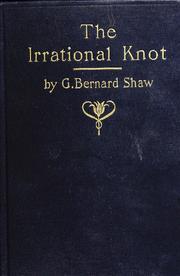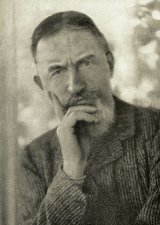The Irrational Knot Page #10
The Irrational Knot was first published in 1905, having been written in 1880. Within a framework of leisure class preoccupations and frivolities Shaw disdains hereditary status and proclaims the nobility of workers. Marriage, as the knot in question, is exemplified by the union of Marian Lind, a lady of the upper class, to Edward Conolly, always a workman but now a magnate, thanks to his invention of an electric motor that makes steam engines obsolete. The marriage soon deteriorates, primarily because Marian fails to rise above the preconceptions and limitations of her social class and is, therefore, unable to share her husband's interests.
"Not much," replied Elinor, shrugging her shoulders. "He is very conceited, and very coarse." "Do you really think so? I expected to find you delighted with his unconventionality. I thought him rather amusing." "I thought him extremely aggravating. I hate to have to speak to people of that sort." "Then you consider him vulgar," said Marian, disappointed. "N--no. Not vulgarer than anybody else. He couldnt be that." "Sherry and soda, Marian?" said Marmaduke, approaching. "No, thank you, Marmaduke. Get Nelly something." "As Miss McQuinch and I are no longer on speaking terms, I leave her to the care of yonder scientific amateur, who has just refused, on teetotal grounds, to pledge the Rev. George in a glass of eighteen shilling sherry." "Dont be silly, Marmaduke. Bring Nelly some soda water." "Do nothing of the sort," said Miss McQuinch. Marmaduke bowed and retired. "What is the matter between you and Duke now?" said Marian. "Nothing. I told him I loathed him." "Oh! I dont wonder at his being a little huffed. How can you say things you dont mean?" "I do mean them. What with his folly, Sholto's mean conceit, George's hypocrisy, that man's vulgarity, Mrs. Fairfax's affectation, your insufferable amiability, and the dreariness of those concertina people, I feel so wretched that I could find it in my heart to loathe anybody and everybody." "Nonsense, Nelly! You are only in the blues." "Only in the blues!" said Miss McQuinch sarcastically. "Yes. That is all." "Take some sherry. It will brighten you up." "Dutch courage! Thank you: I prefer my present moroseness." "But you are not morose, Nelly." "Oh, stuff, Marian! Dont throw away your amiability on me. Here comes your new friend with refreshments. I wonder was he ever a waiter? He looks exactly like one." After this the conversation flagged. Mrs. Fairfax grew loquacious under the influence of sherry, but presently a reaction set in, and she began to yawn. Miss McQuinch, when her turn came, played worse than before, and the audience, longing for another negro melody, paid little attention to her. Marian sang a religious song, which was received with the respect usually accorded to a dull sermon. The clergyman read a comic essay of his own composition, and Mrs. Fairfax recited an ode to Mazzini. The concertinists played an arrangement of a quartet by Onslow. The working men and women of Wandsworth gaped, and those who sat near the door began to slip out. Even Miss McQuinch pitied them. "The idea of expecting them to be grateful for an infliction like that!" she said. "What do people of their class care about Onslow's quartets?" "Do you think that people of any class, high or low, would be gratified by such an entertainment?" said Conolly, with some warmth. No one had sufficient spirit left to reply. At last the concertinists went home, and the reading drew to a close. Conolly, again accompanied by Marian, sang "Tom Bowling." The audience awoke, cheered the singer heartily, and made him sing again. On his return to the green-room, Miss McQuinch, much affected at the fate of Bowling, and indignant with herself for being so, stared defiantly at Conolly through a film of tears. When Marmaduke went out, the people also were so moved that they were ripe for laughter, and with roars of merriment forced him to sing three songs, in the choruses of which they joined. Eventually the clergyman had to bid them go home, as Mr. Lind had given them all the songs he knew. "I suppose you will not come with us, Duke," said Marian, when all was over, and they were preparing to leave. "We can drop you at your chambers if you like; but you will have to sit on the box. Mrs. Leith Fairfax, George, Nelly, and I, will be a carriageful." Marmaduke looked at his watch. "By Jove!" he cried, "it is only ten. I forgot how early we began to-night. No thank you, Marian: I am not going your way; but you may take the banjo and keep it until I call. Ta ta!" They all went out together; and the ladies, followed by the clergyman, entered their carriage and drove away, leaving Marmaduke and Conolly standing on the pavement. Having shared the success of the concert, each felt well disposed to the other. "What direction are you going in?" said Marmaduke. "Westminster Bridge or thereabouts," replied Conolly. "This place is rather out of the way." "Have you anything particular to do before you turn in for the night?" "Nothing at all." "Then I'll tell you what it is, old man. Lets take a hansom, and drive off to the Bijou. We shall just be in time to see Lalage Virtue in the burlesque; and--look here! I'll introduce you to her: youre just the sort of chap she would like to know. Eh?" Conolly looked at him, nodded, and burst out laughing. Marmaduke, who had set him down as a cool, undemonstrative man, was surprised at his hilarity for a moment, but presently joined in it. Whilst they were both laughing a hansom appeared, and Conolly, recovering himself, hailed the driver. "We shall get on together, I see," said Marmaduke, jumping into the cab. "Hallo! The Bijou Theatre, Soho, and drive as fast as you can afford to for half a sovereign." "Right you are, sir," replied the driver, whipping his horse. The rattling of the cab silenced Conolly; but his companion persisted for some time in describing the burlesque to which they were going, and particularly the attractions of Mademoiselle Lalage Virtue, who enacted a principal character therein, and with whom he seemed to be in love. When they alighted at the theatre Marmaduke payed the cabman, and Conolly took advantage of this to enter the theatre and purchase two stall tickets, an arrangement which Lind, suddenly recollecting his new friend's position, disapproved of, but found it useless to protest against. He forgot it on hearing the voice of Lalage Virtue, who was at that moment singing within; and he went to his stall with his eyes turned to the stage, treading on toes and stumbling as children commonly do when they walk in one direction and look in another. An attendant, who seemed to know him, proffered a glass for hire. He took it, and leveled it at Mademoiselle Lalage, who was singing some trivial couplets much better than they deserved. Catching sight of him presently, she greeted him with a flash of her dark eye that made him writhe as though his heart had received a fillip from a ponderable missile. She did not spare these roguish glances. They darted everywhere; and Conolly, looking about him to note their effect, saw rows of callow young faces with parted lips and an expression which seemed to have been caught and fixed at the climax of a blissful chuckle. There were few women in the stalls, and the silly young faces were relieved only by stupid old ones. The couplets ended amidst great applause. Marmaduke placed his glass on his knees, and, clapping his hands vigorously, turned to his companion with a triumphant smile, mutely inviting him to clamor for a repetition of the air. But Conolly sat motionless, with his arms folded, his cheek flushed, and his brow lowered.
Translation
Translate and read this book in other languages:
Select another language:
- - Select -
- 简体中文 (Chinese - Simplified)
- 繁體中文 (Chinese - Traditional)
- Español (Spanish)
- Esperanto (Esperanto)
- 日本語 (Japanese)
- Português (Portuguese)
- Deutsch (German)
- العربية (Arabic)
- Français (French)
- Русский (Russian)
- ಕನ್ನಡ (Kannada)
- 한국어 (Korean)
- עברית (Hebrew)
- Gaeilge (Irish)
- Українська (Ukrainian)
- اردو (Urdu)
- Magyar (Hungarian)
- मानक हिन्दी (Hindi)
- Indonesia (Indonesian)
- Italiano (Italian)
- தமிழ் (Tamil)
- Türkçe (Turkish)
- తెలుగు (Telugu)
- ภาษาไทย (Thai)
- Tiếng Việt (Vietnamese)
- Čeština (Czech)
- Polski (Polish)
- Bahasa Indonesia (Indonesian)
- Românește (Romanian)
- Nederlands (Dutch)
- Ελληνικά (Greek)
- Latinum (Latin)
- Svenska (Swedish)
- Dansk (Danish)
- Suomi (Finnish)
- فارسی (Persian)
- ייִדיש (Yiddish)
- հայերեն (Armenian)
- Norsk (Norwegian)
- English (English)
Citation
Use the citation below to add this book to your bibliography:
Style:MLAChicagoAPA
"The Irrational Knot Books." Literature.com. STANDS4 LLC, 2024. Web. 23 Dec. 2024. <https://www.literature.com/book/the_irrational_knot_7>.




Discuss this The Irrational Knot book with the community:
Report Comment
We're doing our best to make sure our content is useful, accurate and safe.
If by any chance you spot an inappropriate comment while navigating through our website please use this form to let us know, and we'll take care of it shortly.
Attachment
You need to be logged in to favorite.
Log In